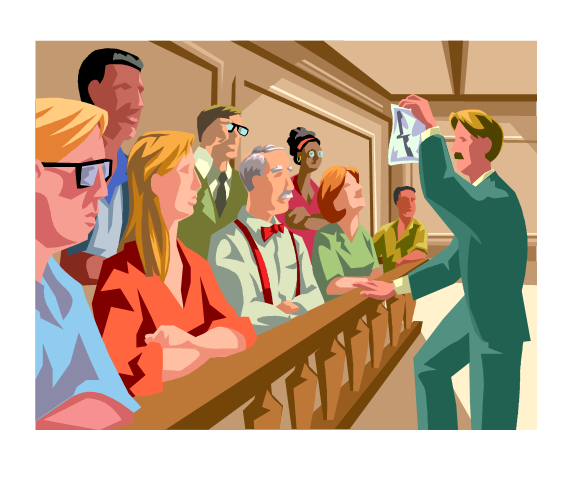 I have prepared a number of voir dires, opening statements and closing arguments. During my preparations, I always have a moment when I stop and say to myself, “What are the rules? What might I say in passing that would create reversible error?” I outline my voir dire, opening statement, and closing argument, I rarely write down a complete sentence. Half the time, I do not know the specifics of what I am going to say until it comes pouring out of my mouth. As a result of my presentation style, I leave myself open to making a mistake if I do not, as part of my preparation, go back and refresh my memory as to the dos and don’ts of talking to the jury. The following is an outline of my dos and mostly don’ts for speaking to a jury. Please feel free to add to the list in the comments below.
I have prepared a number of voir dires, opening statements and closing arguments. During my preparations, I always have a moment when I stop and say to myself, “What are the rules? What might I say in passing that would create reversible error?” I outline my voir dire, opening statement, and closing argument, I rarely write down a complete sentence. Half the time, I do not know the specifics of what I am going to say until it comes pouring out of my mouth. As a result of my presentation style, I leave myself open to making a mistake if I do not, as part of my preparation, go back and refresh my memory as to the dos and don’ts of talking to the jury. The following is an outline of my dos and mostly don’ts for speaking to a jury. Please feel free to add to the list in the comments below.
DO:
- ask any question that is reasonably calculated to identify a bias, prejudice, or any other statutory disqualification from jury service.
- argue on your analysis of the evidence, and other permissible considerations, for any position or conclusion with respect to the matters stated.[1]
- use hypothetical facts to discover bias.
- ask a juror to commit to a position that is required by law.
DON’T:
- ask a question the answer to which may show that the prospective juror has been convicted of an offense which disqualifies him, or that he stands charged by some legal accusation with theft or any felony.[2]
- I am fairly sure I have never done this because I simply do not know what it means. Best not embarrass a juror by asking about their personal criminal background.
- state or allude to any matter that you do not reasonably believe is relevant to the proceeding or that will not be supported by admissible evidence.[3]
- assert personal knowledge of facts in issue except when testifying as a witness.[4]
- state a personal opinion as to the justness of a cause, the credibility of a witness, the culpability of a civil litigant or the guilt or innocence of an accused.[5]
- ask any question intended to degrade a witness or other person except where you reasonably believes that the question will lead to relevant and admissible evidence.[6]
- engage in conduct intended to disrupt the proceedings.[7]
- attempt to bind or commit a prospective juror to a verdict based on a hypothetical set of facts.
- isolate one specific fact of the case and ask whether the panelist could be fair, regardless of the other evidence, based on that specific fact.[8]
- ask the panelist if one party is starting out ahead after the panelist heard a summary of the facts of the case.[9]
- if you are representing the plaintiff, tell the panel that the defendant has insurance or the plaintiff has no insurance; if you are representing the defendant, tell the panel that the plaintiff has insurance.[10]
- ask a question for which the prejudicial effect outweighs the probative value.[11]
- advise the panel of the effect of their answers.[12]
- discuss evidence that will be inadmissible at trial.[13]
I must admit, my list is a combination of my notes from Practice Court, 2003, combined with O’Connor’s Texas Rules – Civil Trials.[14] However, not much has changed since I originally put these two sources together. Please share any additional Dos and Don’ts you might have in the comments below.
[1] Tex. Rules of Prof’l Conduct 1 3.04(c)(3).
[2] Tex. R. Civ. P. 230.
[3] Tex. Rules of Prof’l Conduct 3.04(c)(2).
[4] Id.
[5] Tex. Rules of Prof’l Conduct 3.04(c)(3).
[6] Tex. Rules of Prof’l Conduct 3.04(c)(4).
[7] Tex. Rules of Prof’l Conduct 3.04(c)(5).
[8] Hyundai Motor Co. v. Vasquez, 189 S.W.3d 743, 756-57 (Tex. 2006).
[9] Cortez v. HCCI-San Antonio, Inc., 159 S.W.3d 87, 94 (Tex. 2005).
[10] Ford v. Carpenter, 216 S.W.2d 558, 559 (Tex. 1949).
[11] Gulf States Utils. Co. v. Reed, 659 S.W.2d 849, 855-56 (Tex.App. – Houston [14th Dist.] 1983, writ ref’d n.r.e.).
[12] Texas Empls. Ins. v. Loesch, 538 S.W.2d 435, 442 (Tex.App. – Waco 1976, writ ref’d n.r.e.).
[13] See, e.g., Travelers Ins. v. DeLeon, 456 S.W.2d 544, 545 (Tex.App. – Amarillo 1970, writ ref’d n.r.e.).
[14] O’Connor’s Texas Rules * Civil Trials (2015), pg. 733
